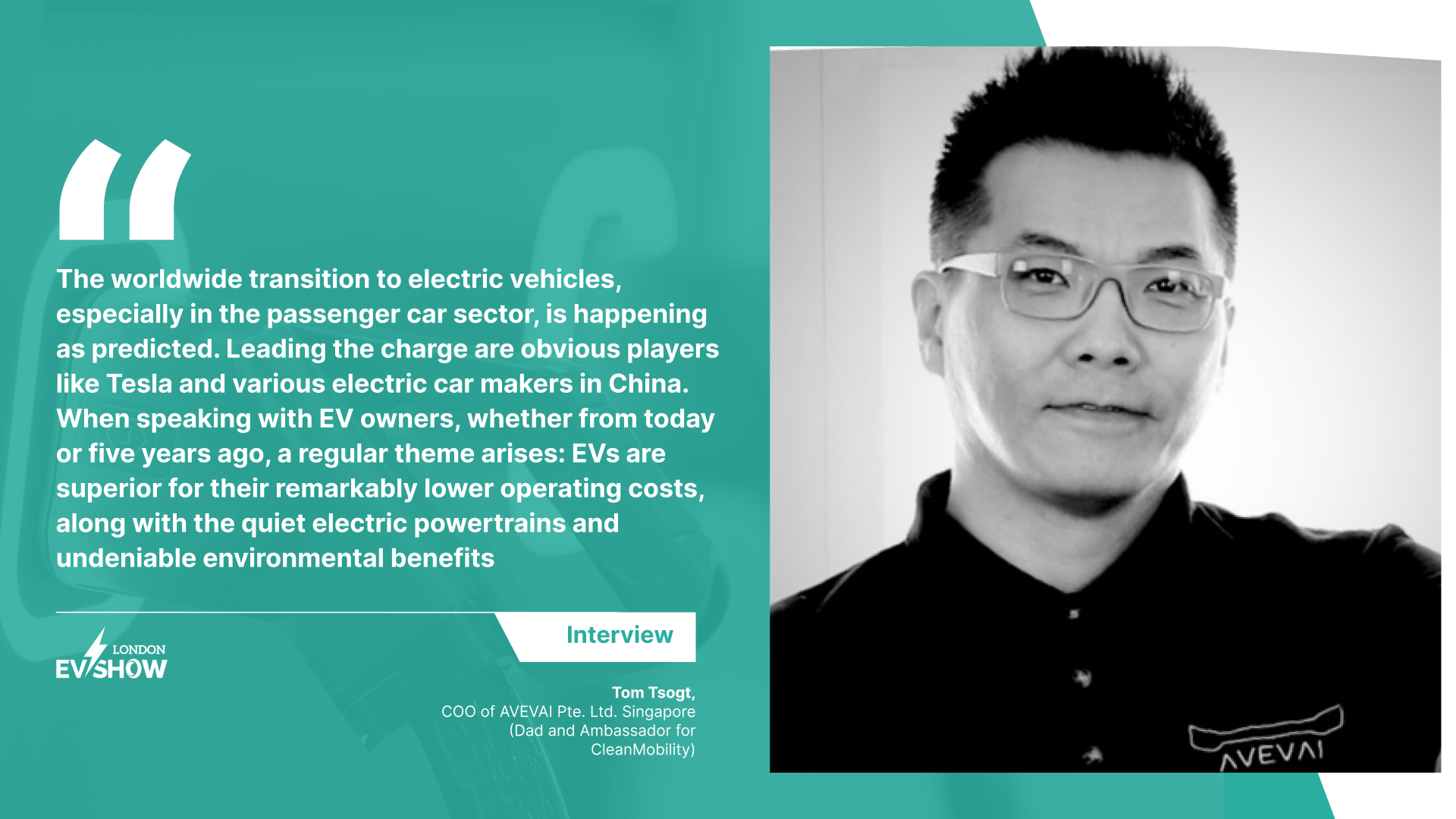In this exclusive Q&A session, we had the privilege of engaging with Mr Tom Tsogt, the Chief Operating Officer of AVEVAI Pte. Ltd. Singapore, a trailblazing figure in the field of clean mobility. As an ambassador for Clean Mobility and a prominent advocate for electric transportation, Mr Tsogt shares his insights on the current state of global EV adoption, the significance of commercial EVs for sustainability, the synergy between manufacturers and policymakers, and the impact of events like the London EV show in shaping the electric vehicle landscape.
Join us as we delve into a conversation that sheds light on the technological, environmental, and economic facets of this transformative transition towards a cleaner automotive future.
#LEVS: What is the current global scenario of electric vehicle adoption, and how is the world responding to and embracing this emerging technology and its widespread acceptance?
Mr Tom Tsogt: The worldwide transition to electric vehicles, especially in the passenger car sector, is happening as predicted. Leading the charge are obvious players like Tesla and various electric car makers in China. When speaking with EV owners, whether from today or five years ago, a regular theme arises: EVs are superior for their remarkably lower operating costs, along with the quiet electric powertrains and undeniable environmental benefits. However, it's important to note that the rapid uptake of commercial electric vehicles hasn't matched that of their passenger EVs. This difference is primarily due to the higher purchase price with less ECV choice. At present, the feasibility of investing in commercial EVs is mainly within the reach of large corporations or government bodies, while small and medium-sized businesses are still considering their options between purchasing used diesel or hybrid vans or trucks.
#LEVS: How do commercial electric vehicles or last-mile logistics solutions contribute to promoting sustainability, and what are the key environmental and economic benefits associated with their widespread implementation?
Mr Tom Tsogt: The first and most crucial point is the economic benefits and environmental benefits are the by-products of it. The biggest pullback of the uptake of ECVs is the purchase cost that makes the ROI longer than expected for bigger ECVs and less products to choose from however when you see it on small and lighter ECVs they are directly competing with the same diesel CVs, already today or even back in 2018.
The ECV term is mostly used by big corporations as a marketing tool to please the shareholders. The real heroes are the startup companies trying to help bypass the initial purchase cost for SMEs by offering competitive monthly rent or lease options by bearing the high purchase price themselves. The high price really doesn’t touch the SME owners, they tend to buy used diesel or hybrid vehicles because of the affordability and pay less attention to the environment, although they have the will to fight climate change caused by transportation.
There are companies who are targeting those SMEs, and AVEVAI is one of them. Our goal was from the inception to offer affordable, right-sized EVs for the market and we are still on course. We currently hold the biggest market share of electric 3W in our home ground and are now stepping up to the next level and recently introduced IONA XS. ECVs with less than 600 kg of payload have no issue with TCO parity to diesel counterparts. If companies would fix the initial purchase price today, there’s a big demand.
#LEVS: How can manufacturers and policymakers collaborate to develop affordable electric vehicles that offer a competitive purchase price compared to their internal combustion engine counterparts while ensuring sufficient driving range to meet the daily needs of SMEs, thus encouraging broader adoption of EVs in the commercial sector?
Mr Tom Tsogt: An effective collaboration between manufacturers and policymakers is crucial. One possible approach that policymakers can consider is evaluating the efficiency of ECVs based on their gross weight. By identifying the most efficient ECVs in the market within specific weight categories, incentives can be strategically allocated. This way, less efficient EVs would receive fewer incentives, while more efficient ones would benefit from higher incentives. This approach not only encourages customers to opt for efficient EVs but also promotes healthy competition among manufacturers to advance in EV technology and software.
A notable trend in the industry is the tendency to equip EVs in general with larger battery packs to achieve greater range. For instance, some ECVs with a gross vehicle weight (GVW) of 4.2 tons are equipped with over 100+ kWh battery pack to achieve over 300 km range, while a less than 90 kWh battery could achieve a similar range. While battery technology is advancing, it will take some time for new chemistries to reach mass adoption. Until then there's a potential for a significant surplus of underutilized batteries by 2030.
To tackle this, I proposed a strategy already back in 2018, emphasizing collaboration between established automakers and innovative startups. This approach is gaining traction, with companies like the VW Group forming partnerships with Chinese EV firms, including startups, to drive advancements in passenger EVs.
In essence, the key lies in aligning policymakers' incentives with manufacturers' efforts to develop the next generation of efficient and cost-effective EVs and ECVs. Rather than solely capping incentives based on price, targeting efficiency through collaboration will result in a more impactful and economically positive outcome.
#LEVS: How do events like the London EV show contribute to raising awareness and promoting the adoption of electric vehicles, and what specific benefits do they offer to consumers, businesses, and the electric vehicle industry?
Mr Tom Tsogt: The 2023 London EV show, with its objective of catering to the complete EV value chain, holds the high potential to advance the cause of electric vehicle adoption. My suggestion for the future is to focus on the most important subjects such as emerging EV technologies that increase energy efficiency and reduce the cost of an EV without compromising the battery pack size and range.
For consumers, LEVS should offer firsthand experience, addressing concerns and dispelling myths and businesses should gain insights into market trends, technologies, forging collaborations, and investment opportunities. LEVS’ contribution to faster electrification and a more environmentally sustainable future, particularly for generations to come, is greatly appreciated. Thank you!


